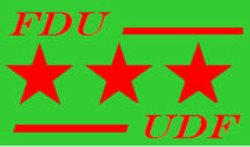On this 60th anniversary of the independence of Rwanda, FDU Inkingi calls on Rwandans to fight to regain the republican and democratic ideals usurped by the RPF dictatorship.
Rwandans,
Dear Friends of Rwanda,
July 1, 1962, is an unforgettable date for the Rwandan people. This date marks the country’s access to political independence, after living for decades under foreign rule and trusteeship, which followed the partition of Africa by European powers at the Berlin Conference from November 15, 1884, to February 26, 1885. The new countries that emerged from the partition were governed at the sole discretion of the foreign power without due consideration of well-being of the indigenous.
During the Berlin Conference, the territory of Ruanda-Urundi was attached to Zanzibar and Tanganyika to form German East Africa. After the Germans lost the First World War, the League of Nations (SDN), future United Nations Organization (UN), entrusted Rwanda and Burundi to Belgium in the form of a mandate and the UN later entrusted them under form of tutelage to Belgium under King Leopold. He had already inherited the wealthy Congo during this colonial division of Africa in Berlin. Rwanda was therefore under Belgian trusteeship and did not really benefit from the momentum of development that was taking place in the Belgian Congo which had a certain level of infrastructure including schools, universities, hospitals, etc. It should be noted that this development was taking place without consultation with local populations and was coupled with serious violations of human rights.
Instead of resolving the prevailing social political issues, Belgian colonization exacerbated ethnocentrism in Rwanda, socio-economic inequalities and political exclusion that were instituted by a feudal regime, which was ruthless and brutal towards the common people.
However, the Catholic Church, whose missionaries always accompanied the European colonizers, nevertheless opened schools, especially seminaries, which allowed some Rwandans outside of the feudal classes to study and be politically aware. In the 1950s, these young leaders, mostly Hutus, began to clearly raise the question of the social and political inequalities established by the feudal regime, supported by the colonial regime. The popular demand for independence throughout Africa in the 1960s coincided in Rwanda with increasing popular pressure for the abolition of the feudal regime dominated by the Nyiginya and Bega clans of the Tutsi ethnic group.
Independence was therefore preceded by the proclamation of the Republic, thus endorsing the abolition of the monarchy, the rejection of the Mwami (king) and the installation of a republican regime, on January 28, 1961, with a president as its head.
Despite the appeal filed by the monarchists, the republican regime was confirmed by the Referendum-Kamarampaka of September 25, 1961, supervised by the United Nations.
The independence of July 1, 1962, therefore, took place in an environment of social unrest. But it gave hope to a whole people who had just regained their freedom, hope of being able to tackle their socio-economic development freely and to live under a democratic system of government in which the leaders are elected by universal suffrage and not by birth as it was during feudal times.
The FDU Inkingi regret, however, that after more than 60 years of independence, our country seems to have returned to a de facto colony, where major decisions concerning the population are taken without consultation, where foreigners seem to have more rights than nationals and where the country seems to have become a company with variable capital in which everyone can buy their shares according to their means.
The Rwandan people, by choosing a republican regime led by leaders elected by the people, with terms fixed by the people and accountable to the people, had the ambition to be the true holders of power. This power was unfortunately taken away from them by force of arms in 1994 and the new rulers have made no effort in the last 28 years to return power to the people, or even to involve them at the very least.
On this anniversary day, FDU-Inkingi therefore wishes to reaffirm that it strongly condemns the lack of respect for republican and democratic institutions, the lack of real independence, particularly lack of input in decisions taken by Rwandan leaders. The glaring lack of democracy, of respect for fundamental human rights, the monopolization of all powers by a party-state, the RPF, and its president Paul Kagame, who totally ignores the constitutional right of other leaders to form a political opposition, show that the spirit of the fathers of independence and of the Republic has been betrayed.
This anniversary of 60 years of independence is therefore a sad anniversary, because, since 1962, until today, the Rwandan people have never enjoyed the fruits of their independence and the situation has worsened under the RPF regime. In addition to lack of political independence, the RPF has added the lack of rights to private property, by adopting laws that dispossess citizens of their land and impose unlimited taxes, etc.
FDU-Inkingi calls on all Rwandans to rise as one to regain their independence usurped by the RPF and to prevent it from continuing to sell the country little by little. FDU also calls on the RPF to correct the situation and give back to Rwandans all their fundamental rights, in particular the right to life and to property, and to give political independence to all citizens wishing to participate in public affairs.
The FDU-Inkingi calls on the International Community, particularly financial donors of the Kigali regime, to take all necessary measures to put pressure on the Rwandan dictatorship to open the political space so that the Rwandan people can finally regain their Republican and Democratic ideals that they chose on January 28, 1961, and reaffirmed with the advent of independence on July 1, 1962.
Done in Paris, July 01, 2022
Dr Emmanuel MWISENEZA
First Vice-President FDU-Inkingi































































